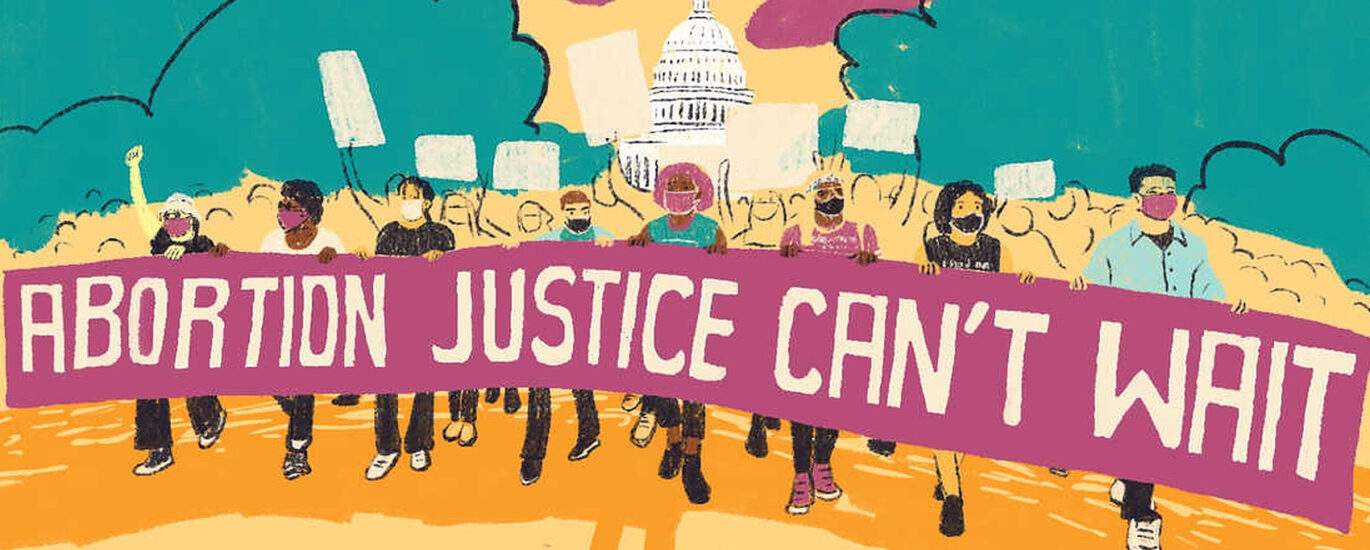“HOLD MEN RESPONSIBLE FOR THEIR ACTIONS.”
This week best-selling author Gabrielle Blair sits down with Amy for an unabashed interview about reproductive rights, contraceptives, and why we continue to prioritize men’s pleasure over women’s health and safety.
Our Guest
Gabrielle Stanley Blair

Gabrielle Stanley Blair (she/her) created an award-winning blog called Design Mom (still going strong 15 years later!), wrote a NYT best-selling book, founded a popular conference called Alt Summit, wrote four viral Twitter threads (and counting!), moved to France, and is raising 6 kids while renovating a house from the 1600s.
The Interview
Amy Allebest: Welcome, Gabrielle!
Gabrielle Blair: Thank you so much, Amy.
AA: Thank you so much for being here. I’m so excited about this. I’m wondering if we can start the episode with you reading your Twitter thread on abortion, and then when you’re done with that, then we can discuss it a little bit and I’ll ask you some questions about it.
GB: Oh, that’s perfect. I would love that. Okay, I’ll begin:
I’m a mother of six, and a Mormon. I have a good understanding of arguments surrounding abortion, religious and otherwise. I’ve been listening to men grandstand about women’s reproductive rights, and I’m convinced men actually have zero interest in stopping abortion. Here’s why…
If you want to stop abortion, you need to prevent unwanted pregnancies. And men are 100% responsible for unwanted pregnancies. No for real, they are. Perhaps you are thinking: IT TAKES TWO! And yes, it does take two for intentional pregnancies. But ALL unwanted pregnancies are caused by the irresponsible ejaculations of men. Period. Don’t believe me? Let me walk you through it. Let’s start with this: women can only get pregnant about 2 days each month. And that’s for a limited number of years. That makes 24 days a year a women might get pregnant. But men can cause pregnancy 365 days a year. In fact, if you’re a man who ejaculates multiple times a day, you could cause multiple pregnancies daily. In theory a man could cause 1000+ unwanted pregnancies in just one year. And though their sperm gets crappier as they age, men can cause unwanted pregnancies from puberty till death. So just starting with basic biology + the calendar it’s easy to see men are the issue here.
But what about birth control? If a woman doesn’t want to risk an unwanted pregnancy, why wouldn’t she just use birth control? If a women can manage to figure out how to get an abortion, surely she can get birth control, right? Great questions.
Modern birth control is possibly the greatest invention of the last century, and I am very grateful for it. It’s also brutal. The side effects for many women are ridiculously harmful. So ridiculous, that when an oral contraception for men was created, it wasn’t approved because of the side effects. And the list of side effects was about 1/3rd as long as the known side effects for women’s oral contraception. There’s a lot to be unpacked just in that story, but I’ll simply point out (in case you didn’t know) that as a society, we really don’t mind if women suffer, physically or mentally, as long as it makes things easier for men. But good news, men: Even with the horrible side effects, women are still very willing to use birth control. Unfortunately it’s harder to get than it should be. Birth control options for women require a doctor’s appointment and a prescription. It’s not free, and often not cheap. In fact there are many people trying to make it more expensive by fighting to make sure insurance companies refuse to cover it. Oral contraceptives for women can’t be acquired easily, or at the last minute. And they don’t work instantly. If we’re talking about the pill, it requires consistent daily use and doesn’t leave much room for mistakes, forgetfulness, or unexpected disruptions to daily schedules. And again, the side effects can be brutal. I’M STILL GRATEFUL FOR IT PLEASE DON’T TAKE IT AWAY.
I’m just saying women’s birth control isn’t simple or easy. In contrast, let’s look at birth control for men, meaning condoms. Condoms are readily available at all hours, inexpensive, convenient, and don’t require a prescription. They’re effective, and work on demand, instantly. Men can keep them stocked up just in case, so they’re always prepared. Amazing! They are so much easier than birth control options for women. As a bonus, in general, women love when men use condoms. They keep us from getting STDs, they don’t lessen our pleasure during sex or prevent us from climaxing. And the best part? Clean up is so much easier — no waddling to the toilet as your jizz drips down our legs. So why in the world are there ever unwanted pregnancies? Why don’t men just use condoms every time they have sex? Seems so simple, right?
Oh. I remember. Men don’t love condoms. In fact, men frequently pressure women to have sex without a condom. And it’s not unheard of for men to remove the condom during sex, without the women’s permission or knowledge. (Pro-tip: That’s assault.) Why would men want to have sex without a condom? Good question. Apparently it’s because for the minutes they are penetrating their partner, having no condom on gives the experience more pleasure. So… there are men willing to risk getting a woman pregnant — which means literally risking her life, her health, her social status, her relationships, and her career, so that they can experience a few minutes of slightly more pleasure? Is that for real? Yes. Yes it is.
What are we talking about here pleasure-wise? If there’s a pleasure scale, with pain beginning at zero and going down into the negatives, a back-scratch falling at 5, and an orgasm without a condom being a 10, where would sex with a condom fall? Like a 7 or 8? So it’s not like sex with a condom is not pleasurable, it’s just not as pleasurable. An 8 instead of a 10. Let me emphasize that again: Men regularly choose to put women at massive risk by having non-condom sex, in order to experience a few minutes of slightly more pleasure.
Now keep in mind, for the truly condom-averse, men also have a non-condom, always-ready birth control built right in, called the pull out. It’s not perfect, and it’s a favorite joke, but it is also 96% effective. So surely, we can expect men who aren’t wearing a condom to at least pull out every time they have sex, right? Nope. And why not? Well, again, apparently it’s slightly more pleasurable to climax inside a vagina than, say, on their partner’s stomach. So men are willing to risk the life, health and well-being of women in order to experience a tiny bit more pleasure for like 5 seconds during orgasm. It’s mind-boggling and disturbing when you realize that’s the choice men are making. And honestly, I’m not as mad as I should be about this, because we’ve trained men from birth that their pleasure is of utmost importance in the world. (And to disassociate sex and pregnancy.)
While we’re here, let’s talk a bit more about pleasure and biology. Did you know that a man CAN’T get a woman pregnant without having an orgasm? Which means that we can conclude getting a woman pregnant is a pleasurable act for men. But did you further know that men CAN get a woman pregnant without HER feeling any pleasure at all? In fact, it’s totally possible for a man to impregnate a woman even while causing her excruciating pain, trauma or horror. In contrast, a woman can have non-stop orgasms with or without a partner and never once get herself pregnant. A woman’s orgasm has literally nothing to do with pregnancy or fertility — her clitoris exists not for creating new babies, but simply for pleasure. No matter how many orgasms she has, they won’t make her pregnant. Pregnancies can only happen when men have an orgasm. Unwanted pregnancies can only happen when men orgasm irresponsibly. What this means is a women can be the sluttiest slut in the entire world who loves having orgasms all day long and all night long and she will never find herself with an unwanted pregnancy unless a man shows up and ejaculates irresponsibly. Women enjoying sex does not equal unwanted pregnancy and abortion. Men enjoying sex and having irresponsible ejaculations is what causes unwanted pregnancies and abortion.
Let’s talk more about responsibility. Men often don’t know, and don’t ask, and don’t think to ask, if they’ve caused a pregnancy. They may never think of it, or associate sex with making babies at all. Why? Because there are 0 consequences for men who cause unwanted pregnancies. If the woman decides to have an abortion, the man may never know he caused an unwanted pregnancy with his irresponsible ejaculation. If the woman decides to have the baby, or put the baby up for adoption, the man may never know he caused an unwanted pregnancy with his irresponsible ejaculation, or that there’s now a child walking around with 50% of his DNA. If the woman does tell him that he caused an unwanted pregnancy and that she’s having the baby, the closest thing to a consequence for him is that he may need to pay child support. But our current child support system is well-known to be a joke. 61% of men (or women) who are legally required to pay it, simply don’t. With little or no repercussions. Their credit isn’t even affected. So, many men keep going as is, causing unwanted pregnancies with irresponsible ejaculations and never giving it thought. When the topic of abortion comes up, men might think: Abortion is horrible; women should not have abortions. And never once consider the man who CAUSED the unwanted pregnancy. If you’re not holding men responsible for unwanted pregnancies, then you are wasting your time. Stop protesting at clinics. Stop shaming women. Stop trying to overturn abortion laws. If you actually care about reducing or eliminating the number of abortions in our country, simply HOLD MEN RESPONSIBLE FOR THEIR ACTIONS.
What would that look like? What if there was a real and immediate consequence for men who cause an unwanted pregnancy? What kind of consequence would make sense? Should it be as harsh, painful, nauseating, scarring, expensive, risky, and life-altering as forcing a woman to go through a 9-month unwanted pregnancy? In my experience, men really like their testicles. If irresponsible ejaculations were putting their balls at risk, they would stop being irresponsible. Does castration seem like a cruel and unusual punishment? Definitely. But is it worse than forcing 500,000 women a year to puke daily for months, gain 40 pounds, and then rip their bodies apart in childbirth? Is a handful of castrations worse than women dying during forced pregnancy & childbirth? Put a castration law on the books, implement the law, let the media tell the story, and in 3 months or less, tada! abortions will have virtually disappeared. Can you picture it? No more abortions in less than 3 months, without ever trying to outlaw them. Amazing.
For those of you who consider abortion to be murder, wouldn’t you be on board with having a handful of men castrated, if it prevented 500,000 murders each year? And if not, is that because you actually care more about policing women’s bodies, morality, and sexuality, than you do about reducing or eliminating abortions? (That’s a rhetorical question.) Hey, you can even have the men who will be castrated bank their sperm before it happens — just in case they want to responsibly have kids some day.
Can’t wrap your head around a physical punishment for men? Even though you seem to be more than fine with physical punishments for women? Okay. Then how about this prevention idea: At the onset of puberty, all males in the U.S. could be required by law to get a vasectomy. Vasectomies are very safe, totally reversible, and about as invasive as an doctor’s exam for a woman getting a birth control prescription. There is some soreness afterwards for about 24 hours, but that’s pretty much it for side effects. (So much better than The Pill, which is taken by millions of women in our country, the side effects of which are well known and can be brutal.) If/when the male becomes a responsible adult, and perhaps finds a mate, if they want to have a baby, the vasectomy can be reversed, and then redone once the childbearing stage is over. And each male can bank their sperm before the vasectomy, just in case. It’s not that wild of an idea. 80% of males in the U.S. are circumcised, most as babies. And that’s not reversible.
Don’t like my ideas? That’s fine. I’m sure there are better ones. Go ahead and suggest your own ideas. My point is that it’s nonsense to focus on women if you’re trying to get rid of abortions. Abortion is the “cure” for an unwanted pregnancy. If you want to stop abortions, you need to prevent the “disease” – meaning, unwanted pregnancies. And the only way to do that, is by focusing on men, because: MEN CAUSE 100% OF UNWANTED PREGNANCIES. Or. IRRESPONSIBLE EJACULATIONS BY MEN CAUSE 100% OF UNWANTED PREGNANCIES.
If you’re a man, what would the consequence need to be for you to never again ejaculate irresponsibly? Would it be money related? Maybe a loss of rights or freedoms? Physical pain? Ask yourselves: What would it take for you to value the life of your sexual partner more than your own temporary pleasure or convenience?
Are you someone who learns better with analogies? Let’s try this one: Think of another great pleasure in life, let’s say food. Think of your favorite meal, dessert, or drink. What if you found out that every time you indulge in that favorite food you risked causing great physical and mental pain for someone you know intimately. You might not cause any pain, but it’s a real risk. Well, you’d probably be sad, but never indulge in that food again, right? Not worth the risk! And then, what if you further found out, there was a simple thing you could do before you ate that favorite food, and it would eliminate the risk of causing pain to someone else. Which is great news! BUT the simple thing you need to do makes the experience of eating the food slightly less pleasurable. To be clear, it would still be VERY pleasurable, but slightly less so. Like maybe you have to eat the food with a fork or spoon that you don’t particularly like. Would you be willing to do that simple thing, and eliminate the risk of causing pain to someone you know intimately, every single time you ate your favorite food? OF COURSE YOU WOULD.
Condoms (or even pulling out) is that simple thing. Don’t put women at risk. Don’t choose to maximize your own pleasure if it risks causing women pain.
In summary:
STOP TRYING TO CONTROL WOMEN’S BODIES AND SEXUALITY.
UNWANTED PREGNANCIES ARE CAUSED BY MEN.
AA: Amazing. Thank you so much, Gabrielle. It’s so powerful hearing you read it too. I don’t think I’ve ever heard it out loud, I’ve just read it a bunch of times in texts. That’s such an important piece. So, first question: I’m curious what the circumstances were that led you to write this Twitter thread?
GB: Yeah, so I published it right around the time that Kavanaugh was being added to the Supreme Court and the hearings were happening. And when I talk about the very beginning that I’ve been hearing men grandstand about women’s reproductive rights, that’s what I was referencing. But I had actually written this, or written out a lot of the ideas, maybe eight months before that (maybe even a year before that) and had just been sort of mulling around and not sure where to put it, you know, not sure where to put these ideas.
I had seen the abortion statistics and they had surprised me; there were more abortions than I understood. And so I was thinking about why that would be because I basically talk to women for a living, right? I share their stories. I interact with them. I have a conference. I have this blog. Now I have social media. All these things for 15 years— talking to women and sharing their stories has been what I do. And if there’s something I understand it’s that women are very aware of their bodies. We don’t necessarily even want to go get a pap smear. Anything having to do with the doctor for gynecological needs is like dread for women it’s so generally unpleasant, and there’s usually no pain medication… anyway, it’s just not something that I know women like to do.
…it’s nonsense to focus on women if you’re trying to get rid of abortions. Abortion is the “cure” for an unwanted pregnancy. If you want to stop abortions, you need to prevent the “disease” – meaning, unwanted pregnancies. And the only way to do that, is by focusing on men
So the idea that women were doing this, having abortions as birth control, just of course made no sense to me. I couldn’t believe that for a second. I’m like, No! Have you met with them? There’s no way that that’s real. Women are very careful with their bodies. So then I was like, okay, so then what would it be?
I was thinking, well, why not birth control? And I instantly knew why: I’ve been on every type of birth control and I hate every single one I’ve been on. I love them. I’m so grateful that I was able to control when I chose to have babies. And I did control that every time, that was always a choice, but they always had side effects that were really, really horrific for me. And beyond that, the side effects that we don’t really think of, not physical side effects, but just the time it takes to maintain your prescription and go visit the doctor and you have new insurance or don’t have insurance, or, you know, is this doctor in your insurance network? All that.
And then filling the prescription and then remembering to take the pill every day, or if it’s not the pill, remembering to get the shot every few months, or if it’s not the shot remembering to what kind of maintenance you need to do for your IUD or do you need to have the one with the hormone or the copper one without the hormone or all the things. There’s just so much of that happening as well. I hated every part of it, and remember, even from a religious standpoint, I am willing to have as many babies as God wants to send. Right? I’m excited to be a mother. I want a big family. I knew that I came from big family. My husband did too. We wanted a big family, why does it have to be this hard to prevent babies from coming?
It just seemed like so much work until we knew we were done and my husband got a vasectomy and I was like, Oh, this is amazing! This is amazing. No side effects for him. All my stress gone. I don’t have to ever think about this again. It’s just beautiful and so much less expensive, so much less maintenance. I mean, you never have to think about it again.
Anyway. So back to this, the thread was… I could instantly see how women could get pregnant or wouldn’t be on birth control because it can be really hard to get birth control. Money-wise, time-wise, physical response-wise. It can be really hard. And then I also understand the power dynamic among men and women, which is not great in a patriarchal society ever, but even worse in the bedroom. I think men are raised with the idea that sex is for men and the pleasure of sex is for men, and for women it’s secondary if they experienced it at all. I mean, it’s not like anyone ever talked to me about condoms.
As a kid I don’t remember a lot of conversations about it, but I definitely understood as I was getting into adulthood that condoms were a joke and that men didn’t want to use condoms. And that, somehow, sex was going to be horrible for years. I had all these bad associations with condoms, you know? It’s pretty pervasive in our culture. I’m sure there were movies or TV shows or something that I saw, but all these thoughts came together and I was like, Okay, it’s hard for me to get birth control.

We have this idea: Men don’t want to use condoms. And there are plenty of men that are sure they don’t want to use condoms whether they even understand how to use them correctly or not. They just are sure they don’t want to use them. And we don’t really care about women’s pleasure. We definitely want to maximize men’s pleasure. It just all came together. I was like, Wait, this isn’t theirs. This is so messed up. It got me really angry and I ended up writing all this stuff out. And then again sitting on it for many months because I wasn’t sure what to do with it.
Then the Kavanaugh hearings were happening and I needed to channel my anger so I wrote my very first Twitter thread, and that was this one.
AA: Wow. How was it received when it came out?
GB: I thought very favorably, very positively. There was plenty of negative, of course, but for anyone who read it, they seem to really appreciate it.
I got wonderful feedback from women, from friends, from strangers. Things like, “oh my gosh, I was like jumping up and down as I read this.” Even people like “I’ve been a feminist for 50 years and I’ve never thought of this. Holy cow, why doesn’t my husband have a vasectomy? I hate being on the IUD.” So this was from women who feel very empowered, who are very forward-thinking and still had never considered that maybe the birth control shouldn’t all be on their shoulders, that their husband could step up or their partner and…it had just never occurred to them. It’s so embedded in our society that women are expected to do all the work of pregnancy preventing. And women are entirely blamed for unwanted pregnancies. This is just a fact in our society. Anyway, so lots of positivity and from plenty of men too, who were like, Whoa, holy cow. I’m going to go make my vasectomy appointment. Or they had never considered it either.
And of course, plenty of people were angry. It’s very interesting because I wrote it in the Fall of 2018; now it’s the fall of 2021 and it still gets retweeted every day. I get people arguing with me on Twitter every day. Every single day. Mostly I ignore it, but if I’m ever in the mood to argue with someone, I always know I can go to Twitter and find someone that’s arguing with my thread.
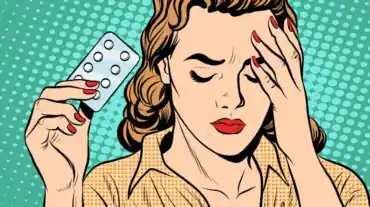
Men regularly choose to put women at massive risk by having non-condom sex in order to experience a few minutes of slightly more pleasure.
It’s interesting because every time you’ll see them start arguing at tweet number two, where it says men cause 100% of unwanted pregnancies, and they can’t get past it. They have no idea what the thread even says. They just can’t get past that, they insist no, it has to be on both of them.
Oh, you would like it to be on both of them? That sounds lovely. What world do you live in where it’s on both of them? It’s not like you can say, “well, the woman can just, you know, tell the man he has to wear a condom” and you’re like, “okay, so she’s being responsible for her body and for his body in that scenario. What’s the man being responsible for?” And of course they’re just so frustrated that I would try and say it’s on men. I’m like, “okay, well, however many millennium we’ve said it’s 100% on women, did that bother you or does it only bother you when I say it’s 100% on men? Can you show me your tweets where you’ve talked about how imbalanced it is that women do all the birth control work and pregnancy prevention work?”
And of course there, they have no tweets about that imbalance because they’ve never noticed it or thought about it until I pointed it out in the thread. Again, never having to actually read the thread. They just got that part; it’s the second tweet where I say men cause 100% of unwanted pregnancies. The cannot get past that.
So there are plenty of men that like to argue with me about that, but I have had thousands of people make the same arguments. It’s also always interesting, cause…you found a thread from three years ago and it’s got hundreds of thousands of responses and you’re pretty sure you have a new original argument to add to this. Welcome to Twitter! I’ve only heard that exact argument, you know, however many thousands of times…
Anyway, it’s interesting, but overall, I would say that the reception has been great. I got invited to conferences to present it. I’ve been able to present it on stage a few times, which is awesome. I know it was added to a couple of textbooks.
AA: That is awesome. That’s so great. One thing that really spoke to me about it was… I was doing a research project on abortion rights for a women’s health and human rights class in grad school. It resonated with me so much because, as you say in the piece, abortion is something that we have to do in order to deal with the real problem. So the root is the unwanted pregnancy and I was trying to figure out some low-hanging fruit that both sides of the political debate could get behind that and say, Yes, we can address this route together. People who feel very strongly that abortion is morally wrong and they have a really, really hard time legalizing abortion— they want to prevent unwanted pregnancies. And then no woman ever wants an abortion because no woman ever wants to be in that heartbreaking position where she realizes that she’s conceived and…nobody wants it by definition.
…men are raised with the idea that sex is for men and the pleasure of sex is for men, and for women it’s secondary if they experienced it at all.
GB: Absolutely. So I was very intentional as I wrote and shared it to start with that I was a mother and that I was a Mormon, and I knew the Mormon part would bring in people that had a typical pro-life stance. So though I don’t have a pro-life stance, I knew that that would make people with a pro-life stance feel like it was probably safe to read. And because for exactly the reason you’re saying: I don’t really talk about abortion. There’s no mention of babies really. We’re talking about unwanted pregnancy. The idea of stopping abortion, the idea of being at an abortion clinic to stop an abortion, it just makes no sense. You’re way too late. You should have prevented the problem in the first place. It was easily preventable. It’s highly preventable. By the time someone has made a decision to get an abortion, you’re not going to change their minds. That’s ridiculous to even think that you would, and again, I positioned the thread in terms of the idea that men really have no interest in reducing abortion or getting rid of abortion. And this is why, and I try and explain why that if they did care, they could easily reduce it. They could eliminate abortions without ever touching on abortion law. Men could to do that no problem. They choose not to.
But I do want to be clear because the thread doesn’t make clear: I’m pro-choice. I’m not out there trying to seek a reduction in abortions, except for that I hated being pregnant so much, and that I would want to see a reduction of abortions if I could prevent people from experiencing that. Physically being pregnant, having to go to the doctor, all of that. I hate all parts of that and would want to eliminate that for women. So as far as wanting to see abortions be reduced, that would be my intention. I don’t want people to have to have that physical experience.
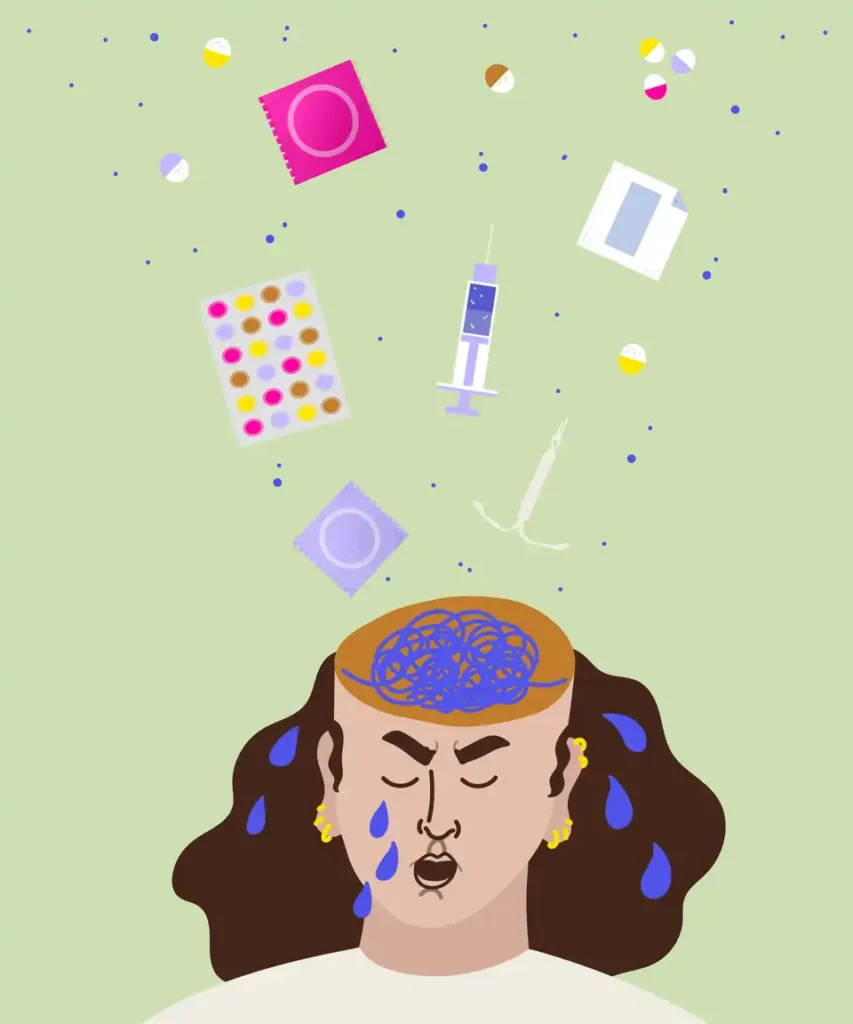
I would also want to see a reduction in abortions because it would mean men weren’t being so casual with women’s bodies. And that I think would be a really good sign. But I don’t have moral issues with abortion, even as a Mormon. I don’t want to get deep in Mormon doctrine, but there is no Mormon doctrine on whether a fetus has a soul. There is no doctrine on that. There is no doctrine on that at all. And so I see no difference and I can only say from my own experience, when I felt I could feel a soul during my pregnancies, and it was basically when I went to labor. So I have my own personal thoughts on all of that and anyone who has experienced pregnancy might have different thoughts from mine, and that’s fine. But I really see no difference between abortion and miscarriage. I just don’t really see a difference there. And in fact, most abortions are experienced as a miscarriage. A woman takes a pill and she’s at home and basically has a miscarriage.
The picture we have of abortion or that the pro-life groups push about abortion is this picture of…they always talk about babies being murdered and torn limb from limb. These are always the phrases they use. And they’re trying to put a picture out there, or they have a picture in their head of a three-month-old baby that’s been born that has been nursing for three months or whatever, being killed. And you’re like, none of this is at all real. This is a fear-mongering tactic. And if you look at the stats, like 90% of abortions are happening before 8 weeks or 12 weeks or very early on. You look at it, you’re like, oh, I wouldn’t recognize this as a human embryo. It is so small. So I just don’t see any moral issues with it there and really value the woman’s life more than the possible-might-be-someday-potential-other-human life that, whether she had continued with pregnancy or not, may or may not develop into a human being.
I’m very disturbed that we don’t value the living woman more than the possible baby. And that we give a lot of lip service to the instinct of mothers and mothers knowing what’s right and what’s best for their kids. And I’m like, okay, well, if that’s even a little bit true and this mother is saying now is not the time to bring a baby to the world, this is not the time for me to take on motherhood, why aren’t we trusting her? If her mother’s instincts are telling her, no, do not have this baby. How is that any different from the mother who’s saying, okay, I know what’s best for my baby? The mother’s instinct either exists or it doesn’t.
Anyway, I have all sorts of thoughts on this, of course.
AA: Well, yes. I mean, so many of the things that you just said, I wish we could go down every rabbit hole and dig into all of them because I mean, this is a podcast on patriarchy, right? And so many of the points that you bring up are specifically about patriarchal structures and how, I mean, you just laid out how you personally feel about abortion and abortion rights and what feels right to you ethically and spiritually and intellectually. And, just to say in terms of mothers’ instincts and intuition…and this is what became so clear to me as I researched abortion for my project. And as we talked about, when we read Roe V Wade, it almost was absurd to me. When I looked at photos of the governing bodies who make these choices and/or who weigh in and have a lot of influence on them, like the Catholic Church, for example. If you look at the authoritative body of the Catholic Church, it is 100% men; hundreds of men and zero women. And in our church, which weighs in really heavily, and people just go with the party line on that…it’s 100% men who are making those decisions.
And then if you even look in our government… like the famous photo that was circulating when Trump and Pence were signing some new bill. I don’t even remember what it was, but there was not one woman in that room. And yet this is an issue that affects 100% women. It takes place literally inside a woman’s body. And so for a man to be making any decision about something that happens inside a woman’s body… I was like, I’ve seen this before. How not only morally wrong, but I was outraged suddenly as I saw it. How does anybody think this makes sense? It’s like treating women as children, like they cannot make good, sound decisions for themselves, for their own bodies.
There were some other things that I wanted to ask you about, kind of in that line of thinking and seeing this in terms of a patriarchal issue. You brought up this irony, right? That men do claim authority to make the laws and make the rules and police women’s reproduction, but then they won’t take responsibility personally, or even as they look at it as a broader issue, they don’t take the responsibility that it is men that caused the unwanted pregnancy. Just the irony there of oh, you can cause the problem. And then you’re going to limit my way of dealing with the problem that you caused me in my life?!
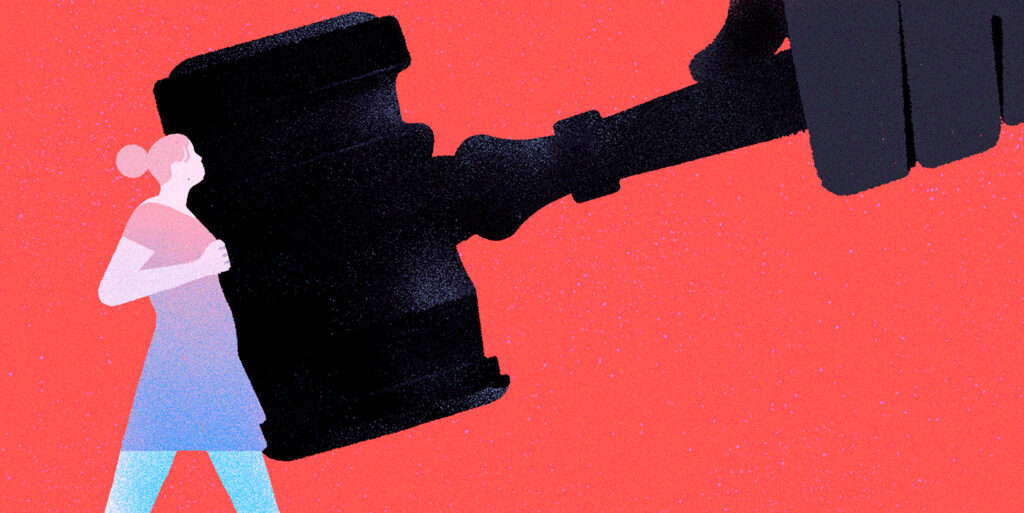
GB: Right, right. And it just becomes so clear that this is this political tool, this bludgeon. I’m thinking of the politicians here who are saying I’m pro-life—they aren’t, they don’t even like…what does that even mean? Besides the, “do they care about kids at all stages of live?”, but even just saying I’m anti-abortion, you’re like how many of you have paid for an abortion from someone that you impregnated or one of your kids impregnated, or for your own daughter or whoever it might be? The wealthy will always be able to get abortions, whether they’re legal or not. You don’t actually care about this. You just know if you say this, you will get the vote. And if you did care about it, there are laws you could make that don’t affect women that could limit the amount of abortions that happen, simply by preventing unwanted pregnancies.
And we know this, and that’s what I try to spell out in the thread. The idea that they are very interested in eliminating abortion, it’s just not true. And it’s not like it’s magic. We know what works. We’ve seen the studies. We know when Colorado provided free birth control, abortions went down. When everyone got free birth control, abortions went down. Why? Because unwanted pregnancies were being prevented. We know what works and if the politicians aren’t out there pushing for, if they’re saying, “Hey, I’m anti-abortion but also no, I don’t support free birth control.” You’re like, you’re not anti-abortion, you’re just saying this phrase, you don’t actually mean it. And we never call them out on it. I feel like any politician who says “I’m anti-abortion” needs to have follow-up questions: What are your proposals for irresponsible ejaculations? How do you propose that we hold men accountable? How much money are you ready to put toward free birth control and how do we make it more accessible? And should there be condoms in every vending machine right next to the Snickers bars? What do we need to do to make this so easy for people? How much are you ready to spend on a campaign that takes the stigma of condoms away?
The men who have figured out how to use them…I have plenty of people saying about the pleasure scale: oh, it’s a condom, like a 7 or 8. But they’re like no, it’s a 10. If you know how to use it and you have the right size (you’re not buying them too big) and you use lubrication properly, I don’t notice a difference. And I’m thinking, Why aren’t we talking about that? Why isn’t there a public campaign that makes it “Of course, no man would have sex without a condom, that would be like not wearing your seatbelt.” Everyone would have to be like, that’s dumb. Why are you doing that? That’s awful.
They could eliminate abortions without ever touching on abortion law. Men could do that no problem. They choose not to.
AA: The metaphor that you use in the piece too, about the food and, you know, making it again, kind of a moral philosophy question, right? Like if you ate this food and it gives you enough psychological distance that you’re not thinking about abortion anymore, and you’re like, oh my gosh, what if I ate every time I ate chocolate, an innocent child would suffer? Of course, I’d never do that! So I love that you used that analogy.
I know that in the Netherlands, we’ve talked about that a bunch on Season One, that they have much better, more comprehensive sex education for kids. And one article that I read talks about boys, I think this must have been mostly when they were teenagers, but talking about like…I would never do that to a girl. I would never endanger her like that. It was just morally repelling for them to think about not using birth control because they see girls as their equals and they would never hurt them. Which brings me to another question: the point that you bring up about how we don’t mind if women suffer and that men’s pleasure is primary. Women’s is definitely secondary and maybe we don’t even care about their pleasure at all. And in fact, we don’t mind if they suffer. Where did that come from? Was that a developed idea that you had before you wrote this thread?
GB: I don’t know if I have a specific instance where it came from, but I just know it to be true in life. I was thinking of it or I first stated it in response to that the men’s birth control wasn’t approved because this idea that we don’t mind if women suffer as long as it makes things convenient for men. And I think I first started thinking about that in terms of motherhood and everything that’s put on mothers, like even in this new day and age. And I know men are, are at least some men are, trying harder at home, but still women are doing the bulk of the parenting. Still women are doing the bulk of the housework and running the household.
Again, we know that women are suffering because of it. Like we know of that. That’s a fact, that’s not a new thing. I didn’t come up with that. Everyone knows that, but as long as it makes things convenient for men, Oh well, the women will have to suffer.
You could think of a thousand instances of it. We can think of every instance where women are suffering and, well, it has to happen as it’s making things convenient for men. Birth control is really hard for lots of women. The side-effects are really hard for lots of women, even when they don’t have side effects, just the maintenance and taking it daily. All of that is hard for women. And there’s a much easier option for men already in existence. I’m not talking about a future pill. I’m talking about condoms and we never act like men need to wear condoms because women will take care of the birth control. Even if they’re suffering. We never, we never asked these wives that read the thread and are like, Holy cow, I hate using birth control. I’ve been doing it for however many years. We’re done having babies. Why in the world am I still suffering? Because then it means my husband didn’t have to think of it. So many couples that aren’t married yet, that aren’t sharing their finances, where I’m hearing from women going, Oh, he should be paying half of all my costs on this birth control. He’s benefiting from this as much as I am, if not more. He should be paying for my time off. Or if I have to get childcare to go to the doctor or to pick up my prescription, all the costs of time and money involved in it. And women are just expected to do it and not complain about it.
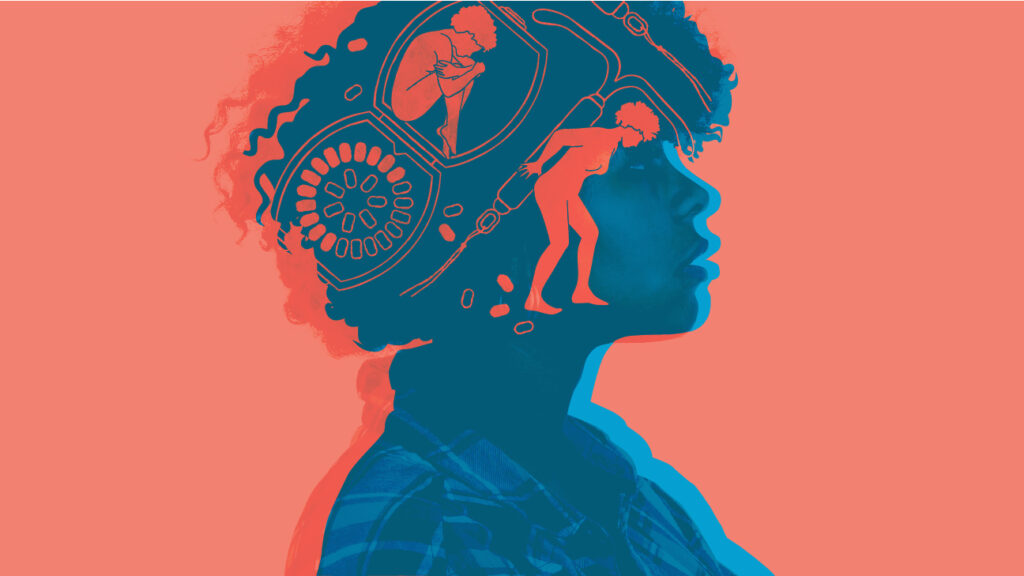
You’re not supposed to talk about the side effects or that it made you gain weight or break out or not break out or lose weight or whatever it is that you know, or much more serious things too. You see it at work all the time. Women? Oh, well, they didn’t get credit for it. Or they were asked to take a secretarial role as long as it makes things more convenient for the men. It’s a pretty constant thing. I have issues with the whole expectation in our society that women will want to have babies or that women should want to have babies. So there’s this expectation: if you’re a woman that can have a baby, you should have a baby, you will have a baby at some point. And pregnancy is really hard and really dangerous and takes your body to like the brink of what can handle.
Childbirth is even worse. I saw all sorts of trauma and I had the most normal pregnancy and childbirth, not even like gestational diabetes, like nothing unusual, and I still have all sorts of trauma from it. It’s and the idea that we should just assume women will be willing to do. This is so bizarre to me. There is nothing, nothing even close that we assume that all or most men will do that’s even like a 10th as hard. And you can say, well, what about soldiers? You’re like, okay, well, women are soldiers too, but also there’s the percentage of men that are soldiers versus women that have babies is not comparable. There’s just nothing that we ask them to do that’s as dangerous. And we go into it not saying, oh, this is dangerous and scary and risky. We go onto it expecting women to be really happy about it.
The way we think about pregnancy is so bizarre. And it also ties into how we think about abortion, because there’s definitely this argument, like, why wouldn’t you just have the baby, like, we don’t understand pregnancy. It’s a joyous thing, having babies is a joyous thing? And I’m like, whoa, let’s back up a few steps. Where did you get that idea?
AA: It reminds me too that there’s a religious foundation with the curse of Eve, right? I’ve read treatises from the middle ages about how women should have pain in childbirth, because that’s part of just their curse of being female. And I think a lot of that comes our comfort at are being okay with women being in pain comes from that as well. I mean, there were a doctors who said when there was anesthetic for women that it wasn’t appropriate for women to have pain relief in labor because it’s part of the curse of Eve. So I think just culturally, even in ways we don’t even realize subconsciously we’re just okay with women being in pain.
GB: I’m sure you’ve read the studies about IUD and pain relief in your readings and I feel like I’ve talked in response to the thread, discussions with many doctors, they want to talk to me about the pain levels of the vasectomies and reassure me like, no, it’s super simple. There are doctors who are very pro-vasectomy saying, no, I hope men get comfortable with it. It’s so great, and they’re administered pain relief and blah, blah, blah. And the discussions end up talking about: it’s about the same amount of pain as when you get an IUD, they would say, except with IUD it’s standard to not administer pain relief. So it’s the same level of pain, but men get pain relief and women don’t. I’ve had an IUD. It was incredibly painful, like screaming, painful, both having it inserted and having it removed eventually when it caused all sorts of problems for me. But yeah, pain relief didn’t even come up. And I didn’t understand until years later, like what, they’re not, why aren’t they giving us pain relief? Like what in the world? So they’re giving men pain relief for vasectomies, which has the same amount of pain, but not for our IUDs…we just are fine for women to suffer.
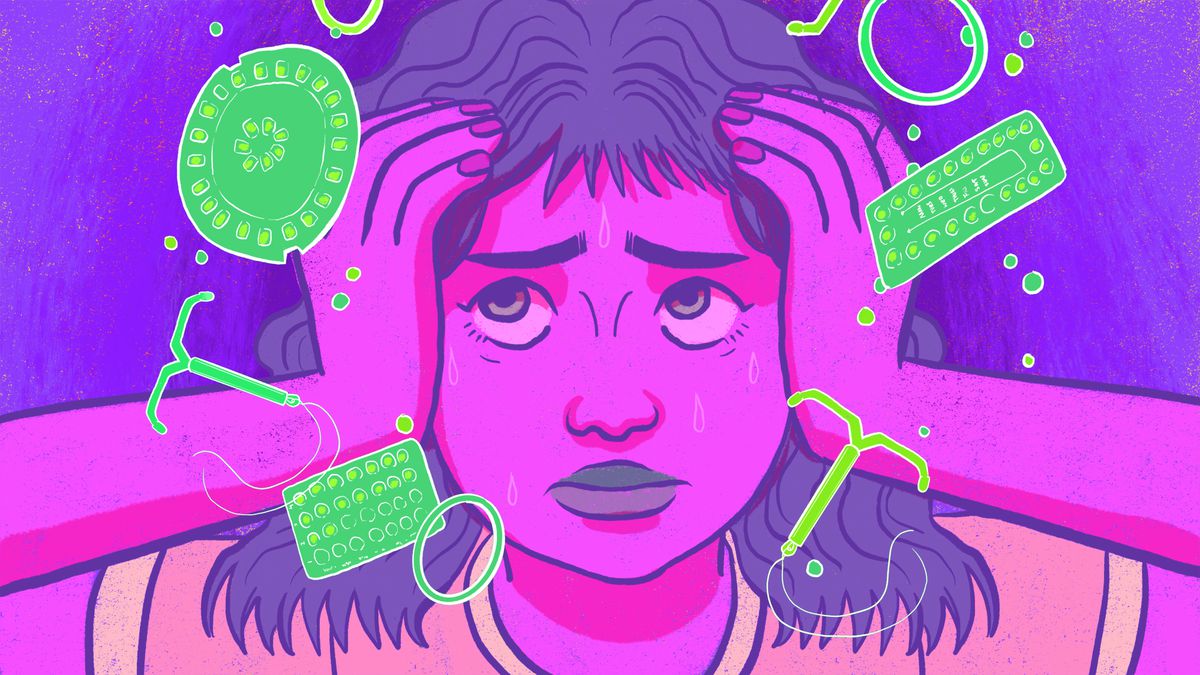
We can think of every instance where women are suffering and, well, it has to happen as it’s making things convenient for men.
AA: Okay. My last question, Gabrielle, before we wrap up is how do you think this whole issue of birth control and abortion rights would be different if the world had always been run by women instead of men?
GB: I really think abortion would be just no different than, you know, taking an aspirin or something for a headache. If you didn’t want to be pregnant, then you’re not pregnant. If the mother doesn’t want to be pregnant, that’s the best decision for the mother. And it’s the best decision for the possible-future-could-have-been-a-child. If the mother does not want to be pregnant, the mother doesn’t want to be pregnant, period. So I think abortion would just be a non-issue, which historically it kind of was a non-issue. I don’t even think that that is a weird or out of reach thing. It feels like we almost had that, and then it kind of disappeared.
And I think that men would be really, really careful with women’s bodies. I think we need to teach men their sperm is dangerous. At the end of the day it can cause a lot of problems, it can really hurt people. A pregnancy can cause all sorts of problems; physically, socially, I mean all the things. So they need to be so careful with it. It’s as if you had a child that had a disease that was very spreadable and could get someone else sick; you would teach this child like, oh, you have to be so careful with your body that you don’t get someone else sick. Like of course, of course. And the child would be fine with that. Like, yes, I’m going to be so careful. I don’t mind get anyone sick. We don’t teach men about their bodies like that. We don’t teach boys about their bodies like that either. And maybe we should. Just this idea that like, Hey, you can cause lots of damage with your body. Not even thinking of muscle and punching and that kind of awful stuff. Men don’t think of that. And I don’t know that women think of that, but I think of women around the world and men would be much more careful with women’s bodies.
AA: Thank you so much, Gabrielle.
If you want to stop abortion, you need to prevent unwanted pregnancies.
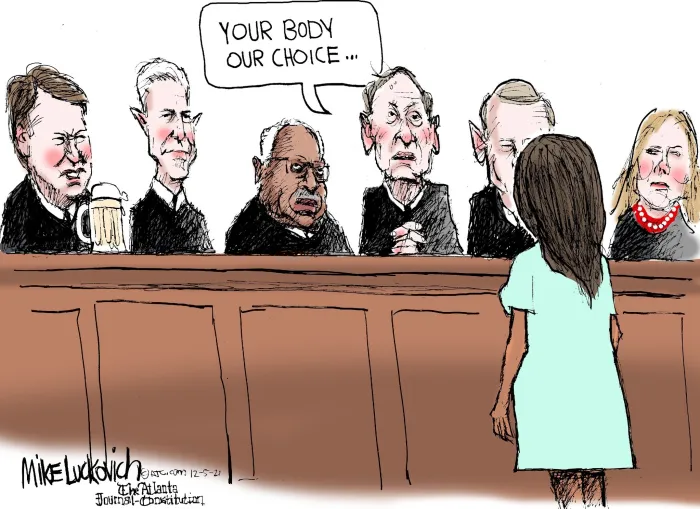
And men are 100% responsible for unwanted pregnancies.
Listen to the Episode
&
Share your Comments with us below!

